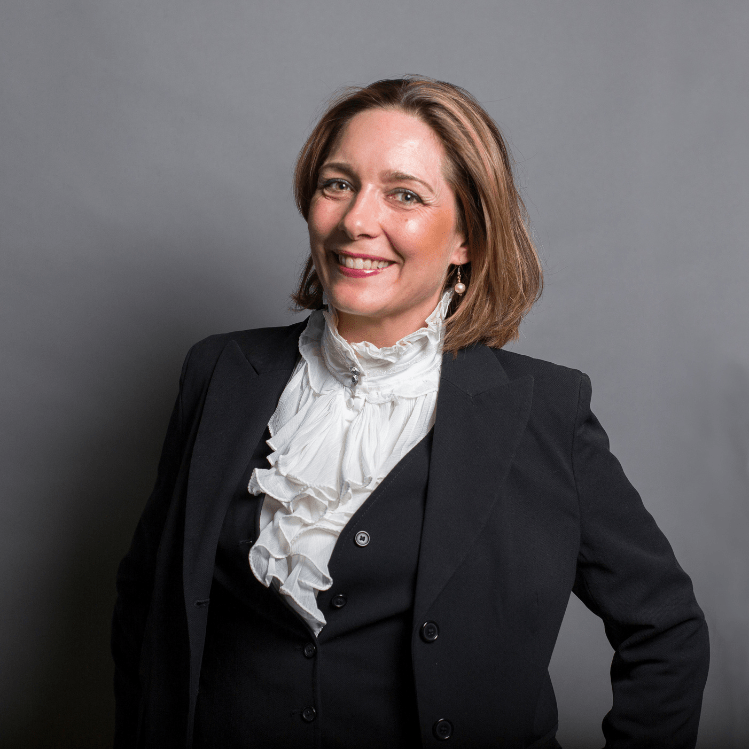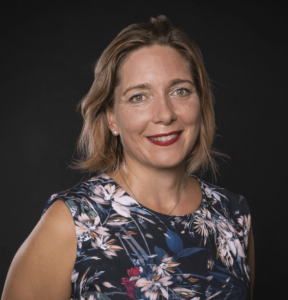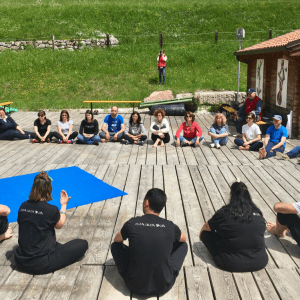
Elena Piani: Shaping the Future Through Sustainability
Elena Corinne Piani is redefining the future of business with her innovative approach to sustainability and organizational change. As the founder of Piani Projects and a seasoned corporate trainer with over 24 years of experience, Elena has worked with multinational companies, diplomatic institutions and small enterprises, driving impactful transformation in corporate social responsibility, communication, and sustainability. Her expertise spans various sectors, from Made in Italy industries to global non-profit organizations. With a passion for fostering diversity, equity, and inclusion, Elena is shaping a more sustainable and inclusive business landscape—one project at a time.
With 24 years of professional experience, can you share the key milestones that shaped your journey, from working at General Electric to founding Piani Projects?

With 24 years of experience across consultancy, multinationals, and diplomatic services, I always aspired to establish my boutique consultancy firm. My journey began with a deep dive into business strategy, culture, and technology’s transformative role across industries. At General Electric (GE), I embraced systems thinking and leadership principles, gaining firsthand insights into knowledge management and corporate culture. During my time there, I identified the need to shift from traditional CSR to creating Corporate Social Value, aligning business purpose with stakeholder engagement. This realization and my passion for fostering learning environments and innovation shaped the foundation for Piani Projects, which I founded in Tuscany at age 35.
At Piani Projects, I focus on connecting purpose, innovation, and impact. I’ve worked with organizations to adopt sustainability frameworks like ISO 26000 and align with the UN 2030 Agenda. My journey has included documenting circular economy practices, developing regional strategies, and empowering individuals with disabilities through training in entrepreneurial and soft skills. Influenced by thought leaders like Peter Senge and Otto Scharmer, I’ve championed leadership approaches rooted in mindfulness, openness, and systems thinking. Today, I am committed to inspiring businesses to view sustainability as an opportunity to innovate and thrive, creating a legacy of positive impact globally.
As a certified Sustainability Manager, what are the most pressing challenges companies face in integrating sustainable practices into their operations?
As a certified Sustainability Manager, one of the most pressing challenges companies face in integrating sustainable practices is bridging the gap between short-term financial goals and the long-term benefits of sustainability. Many organizations still perceive sustainability as a cost rather than an opportunity for innovation and value creation. The adoption of the European Sustainability Reporting Standards (ESRS), as mandated by the Corporate Sustainability Reporting Directive (CSRD – Directive EU 2022/2464), introduces stricter requirements for transparency and accountability. These new standards are driving businesses to swiftly transform their mindset, strategy, and organizational structures to meet the evolving demands of sustainability reporting.. Navigating these changes can be overwhelming, especially for
companies unprepared for the complexity of regulatory compliance and evolving stakeholder Expectations.
I firmly believe that the best way to address these challenges is by investing not only in innovative industrial solutions but also in adopting a people-centred approach. Training plays a vital role in this transformation—not just to empower employees but also to build awareness of internal and external dynamics. Through tailored training programs, I help organizations uncover creative and innovative solutions, leveraging the diversity of their teams—whether functional or product-based. This approach fosters collaboration, mitigates resistance to change, and equips businesses to align with frameworks like ISO 26000 and the UN 2030 Agenda. By fostering collaboration, creating psychological safety, and building structured processes for change, I help businesses shift toward purpose-driven models that meet compliance requirements, remain competitive, and drive long-term impact.
Could you elaborate on how you approach fostering corporate innovation across different industries, particularly in the “Made in Italy” sectors?
Fostering corporate innovation requires a nuanced approach that considers the unique characteristics of each industry while aligning with broader trends like sustainability and digital transformation. In the “Made in Italy” sectors—renowned for their craftsmanship, creativity, and heritage—innovation often stems from blending tradition with modernity. My approach begins with understanding the organization’s core values and its market position, identifying opportunities to enhance its competitive advantage while staying true to its roots. I work closely with leadership teams to integrate sustainability as a driver of innovation,
emphasizing frameworks like circular economy models and ISO 26000. Training is a cornerstone of this process, as I believe empowering employees at all levels fosters creativity and problem-solving. By engaging diverse teams and leveraging their unique perspectives, whether functional or product-focused, we uncover fresh ideas that resonate with evolving market demands.
In the “Made in Italy” sectors, I’ve found that innovation thrives at the intersection of design, technology, and sustainability. For example, in traditional industrial districts, I facilitate workshops to encourage cross-industry collaborations, driving both process and product innovation. Whether working with artisanal producers or high-tech manufacturers, I guide organizations in aligning their strategy with global trends such as digitalization and the UN 2030 Agenda. This holistic approach ensures that innovation not only sustains the legacy of “Made of Italy”; but also propels it into the future with purpose and resilience.
You’ve facilitated European projects focused on youth and female empowerment. Can you share an impactful story or outcome from one of these Initiatives?
One of the most impactful projects I facilitated focused on empowering young women across Europe to build entrepreneurial and leadership skills, particularly in underserved communities. The initiative aimed to bridge the gap between potential and opportunity by providing tailored training in business development, emotional intelligence, and communication skills. One participant, a young woman from a rural area, came into the program hesitant and unsure about her future. Throughout the training, she discovered her passion for sustainable fashion and, with guidance from one of the project partners, she developed a business plan that incorporated both local craftsmanship and partnerships to launch her business.
By the end of the project, not only had she launched her brand, but she also became a mentor to others in her community, creating a ripple effect of empowerment. This experience underscored for me the importance of fostering confidence, providing practical tools, and creating networks of support. It also highlighted the immense untapped potential within young women who, when given the right resources and environment, can become powerful agents of change in their communities. Projects like this reaffirm my belief in the transformative power of education, mentorship, and collaboration to drive both personal and societal progress.
One of your standout projects involved training and coaching youth with disabilities to thrive in business roles. What were the biggest takeaways for you from this experience?
Training and coaching youth with disabilities to thrive in business roles has been one of the most profound and rewarding experiences of my career. This work offered invaluable insights into the systemic changes needed for meaningful workplace inclusion and inspired me to author a book on employability, disability, and the workplace. The book seeks to empower individuals while guiding organizations toward a genuine commitment to inclusion and competitiveness.
In the book, I take a holistic approach, examining workplace inclusion from the perspective of all key stakeholders: nonprofits, families, individuals, HR managers, supervisors, team members, and public institutions. I delve into the essential training, management strategies, and reasonable accommodations required to ensure that people with disabilities not only integrate but excel in their professional roles. Toward the conclusion, I advocate for the establishment of a permanent observatory on workplace inclusion and propose a pioneering intermediary role—an innovative blend of an educator who navigates emotional dynamics and a business coach fluent in organizational language. This role would bridge individual needs with business priorities, aligning personal development with organizational objectives.
By combining emotional intelligence with business acumen, this dual approach fosters workplaces where diversity, equity, and inclusion become integral to both culture and strategy. It lays the foundation for environments that celebrate differences, maximize potential, and reflect the values of a truly inclusive society.
Diversity, Equity, and Inclusion are central to your work. How do you tailor your approach to help organizations adopt and implement effective DEI policies?

Diversity, Equity, and Inclusion (DEI) are not just policies but essential drivers of innovation, collaboration, and long-term organizational success. My approach to helping organizations adopt and implement effective DEI policies is deeply informed by my international educational background and my experience working in diplomacy, where I collaborated with UN agencies for food and agriculture and trained advocacy groups to make education accessible to all. These experiences have given me a global perspective on inclusivity and equity, as well as practical insights into navigating diverse cultural, social, and organizational landscapes.
I begin by conducting a comprehensive assessment of an organization’s existing practices, workforce dynamics, and cultural context to identify gaps and opportunities. Drawing from my expertise, I design tailored interventions that go beyond compliance to foster authentic cultural transformation. Training plays a central role in my work; I use it to build awareness, empower teams, and enhance the skills needed to navigate differences and embrace inclusive practices.
I also collaborate closely with HR and leadership to integrate equity into recruitment, career development, and performance management. My focus is on creating environments where individuals feel psychologically safe, valued, and heard. Leveraging frameworks like ISO 26000 and the UN 2030 Agenda, I help organizations align DEI initiatives with their broader sustainability and corporate responsibility goals. By integrating diverse perspectives and fostering equitable opportunities, I guide organizations in building cultures where inclusion is not only prioritized but also seen as a pathway to innovation and sustainable success.
For companies and non-profits aiming to excel in sustainability reporting, what key elements should they focus on to ensure transparency and impact?
To excel in sustainability and impact reporting, companies and non-profits must focus on transparency, strategic alignment, and stakeholder engagement. This begins with understanding their unique contexts and identifying material issues that resonate with their purpose, goals, and the needs of their stakeholders. Companies should align ESG -Environmental, Social and Governance – priorities with financial performance, while non-profits should focus on mission-driven outcomes that incorporate ESG dimensions. Both sectors benefit from adhering to globally recognized frameworks such as EFRAG CSRD for companies or donor-specific standards for non-profits, ensuring credibility and trust.
A robust reporting approach balances quantitative metrics with compelling narratives to showcase progress, strategic investments, and purpose-driven actions. Companies can use this to demonstrate the business value of sustainability, while non-profits can highlight mission success and attract partnerships. Transparent data collection, stakeholder dialogue, and adaptability to evolving regulations reinforce accountability and foster innovation. By investing in training, capacity-building, and human-centered approaches, organizations can transform reports into strategic assets that inspire trust, drive impact, and contribute meaningfully to sustainable growth.
As a lecturer in various academic programs, how do you ensure your teaching remains relevant to the rapidly changing corporate landscape?
I approach teaching with a deep commitment to delivering relevant, transformative education that prepares participants for today’s dynamic corporate landscape. By aligning my content with course objectives, professional qualifications, and participants’ learning goals, I ensure a cohesive and valuable learning experience. I collaborate with fellow professors to integrate my lectures seamlessly into broader programs, ensuring practical applicability for students. To stay current, I invest around 300 hours annually in certifications, continuing education, and forward- looking courses like Federmanager Academy’s Twin Revolution, which explored AI and cutting- edge business practices. Additionally, I stay informed through publications like McKinseyQuarterly and MIT Sloan Management Review while engaging in activities like ESG evaluations through Banca Etica, contributing to ethical finance while deepening my expertise. Beyond formal learning, I refine my teaching and facilitation skills through active involvement in
the National Trainers Association, where I propose and attend workshops and training sessions. Experiential educators; and facilitators’ unconferences (using Open Space Technology) provide opportunities to exchange feedback and hone methodologies. Volunteering with organizations focused on citizenship, disability management and female empowerment enriches my perspective, as does serving as AILO co-chair for FAWCO, a global NGO dedicated to education, human rights, and sustainability. Balancing professional and personal growth, I embrace mindfulness, physical activity, and insights from my children, ensuring my teaching reflects both professional excellence and holistic well-being.
What is your long-term vision for Piani Projects, and how do you envision its role in shaping sustainable and inclusive businesses globally?

Recognizing the privilege of having access to international education, diverse organizations, and exposure to a variety of cultures and global social and environmental challenges—coupled with fluency in several languages—my long-term vision for Piani Projects is to become a global leader in driving sustainable and inclusive business transformation. I aim to partner with organizations across industries, helping them align with global frameworks such as the UN 2030 Agenda and ESG standards while fostering cultures rooted in inclusion, innovation, and resilience.
Central to this mission is shifting perceptions of sustainability and inclusivity—from compliance obligations to opportunities for creating enduring stakeholder value. By offering tailored solutions that bridge
the gap between strategy and execution, Piani Projects empowers businesses to adopt circular models, embrace systemic change and unlock their creative potential.
Looking ahead, I envision Piani Projects as a key player in fostering cross-sector collaboration and expanding partnerships with academic institutions, businesses, non-profits, and governments to tackle global challenges like climate change and social equity. By strengthening expertise in training and capacity-building, leveraging advanced technologies, and championing human- centred approaches, Piani Projects will inspire businesses to innovate, adapt, and lead. Ultimately, the goal is to leave a legacy of empowered organizations that thrive financially while contributing meaningfully to a more sustainable, inclusive, and equitable future for all.
APPLY TODAY
100 Top Global Women Entrepreneurs – Global Woman Magazine
Our Journey in 12 Months:
Our Journey in 12 Months – Global Woman Magazine
5 Things That Show Money is Not Evil:
5 Things to Show That Money Is Not Evil – Global Woman Magazine
Global Man Magazine Page:
Global Woman, Global Man: Socials:
Global Woman Magazine (@global_woman.magazine) • Instagram photos and videos






